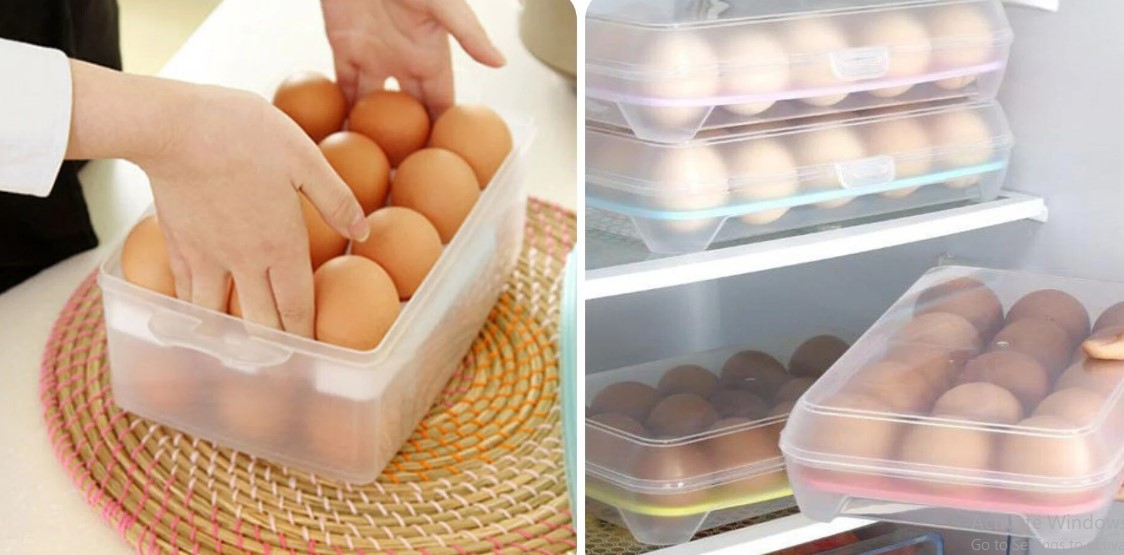Eggs are a nutritious food that provides high-quality protein and is easily absorbed. Additionally, eggs contain many vitamins and minerals such as vitamin A, folate, vitamin B5, vitamin B12, vitamin B2, along with phosphorus, calcium, and zinc. Eggs contain a lot of cholesterol, but the cholesterol in eggs is not the cause of increased cholesterol in the blood.
Using eggs is a good way to increase HDL – a type of good cholesterol that helps reduce the risk of cardiovascular diseases, stroke, and other diseases. According to many studies, eating two eggs a day for six weeks can increase HDL levels by 10%.
Another important nutrient in eggs is choline. Choline is involved in cell membrane formation and produces signaling molecules in the brain to control other functions.
Not only good for health, eggs are also easy to process into many dishes, so they are often stored in the refrigerator. However, according to experts, storing eggs in the refrigerator door is not suitable.
Vlatka Lake – Business Director of the Space Station storage company – said that the refrigerator door is the most unstable temperature area, with frequent temperature changes due to opening and closing. If stored in this position, eggs will become more susceptible to spoilage. In addition, frequent opening and closing also exert a force on the door, causing the eggs to shake and the quality to deteriorate.
Explaining why eggs should not be kept on the refrigerator door, Dr. Ta Tung Duy (Vietnam Applied Medical Institute) also shared on Vietnamnet that although the refrigerator door is where people often store eggs, this position frequently changes temperature after each opening – closing, bacteria can develop and weaken the protective layer of the egg, thereby increasing the risk of infection and causing the eggs to spoil quickly.

Illustration photo.
A good way to store eggs is to put them in dedicated trays, tightly close the lid to avoid absorbing the smell and taste of other foods in the refrigerator. It is recommended to place the egg tray/box in the middle or deeper part of the refrigerator, and the temperature needs to remain stable at below 20 degrees Celsius.
Sharing more about egg storage, Prof. Dr. Phan Bich Nga, National Institute of Nutrition, said that freshly laid chicken eggs always have a layer of pink bloom. That is a protective layer, preventing bacteria from entering. When there is that bloom layer, chicken eggs that are incubated will have a high hatching rate.
However, despite the pink bloom layer, because poultry eggs are laid along with feces, there are many types of bacteria. For example, in duck eggs or goose eggs, there are many salmonella bacteria – a type of bacteria that causes a very high infection rate.
Therefore, for eggs purchased at supermarkets or markets for the purpose of using as food (not using eggs for hatching), housewives must clean the eggs before putting them in the refrigerator for storage.
Medical and nutrition experts believe that if eggs are not wiped clean before being placed in the refrigerator, this will be a source of bacterial infection. If purchased at local markets, Prof. Nga recommends quickly washing, preferably with lightly salted water, or can be rinsed with normal clean water, then dry the eggs and store them in a cool compartment of the refrigerator. If purchased at supermarkets, the eggs have already been sanitized, so there is no need to clean them again.
How to identify fresh, good quality eggs
– Observe the eggshell
Use your eyes to observe the shape, color, and transparency of the eggshell. Fresh, good quality chicken eggs have intact shells, not shiny, and have a layer of white bloom resembling dew, bright color. In contrast, eggs that have been processed and packaged industrially will not have this bloom layer. Poor quality chicken eggs may have cracked shells, dents, or folds, the egg white spills out, or there may be seepage marks on the shell resembling a damp moldy corner of a wall.
In addition, fresh, good-quality eggs have slightly rough shells. When gently turned in the hand, you cannot feel that the yolk and egg white inside are sticky and slippery, just like in the case of older eggs.
– Listen to the sound
Hold the eggs in your hand, gently tap the eggs together, or shake them gently, and listen to the sound they make. Fresh, good-quality eggs, when tapped together, will make a clear sound, and when shaken gently, there will be no sound.
Poor-quality eggs, when tapped together, will make a cracking or hollow sound. If shaken gently, you will feel movement inside or a faint sound. The older the eggs, the more you will feel like there is liquid moving inside.
– Smell
Use your mouth to breathe hot air on the eggshell, then use your nose to smell this gas. Fresh, good-quality eggs will have a smell of raw lime. In contrast, poor-quality eggs may have a faint moldy smell. If the eggs are spoiled, they will have a moldy, sour, rotten smell.
According to Nguoi Dua Tin
According to studies, consuming two eggs a day for six weeks can increase HDL levels by 10%. HDL is the good cholesterol that helps reduce the risk of cardiovascular diseases and stroke.
Choline is a vital nutrient found in eggs, which plays a role in cell membrane formation and the production of signaling molecules in the brain. It helps control various functions in the body.
It is not advisable to store eggs on the refrigerator door as this area is subject to frequent temperature changes. Instead, keep eggs in dedicated trays or boxes, tightly closed, in the middle or deeper part of the refrigerator, where the temperature remains stable below 20°C.
Eggs, especially those purchased from local markets, may carry bacteria on their shells. Cleaning them with lightly salted water or normal clean water helps remove bacteria and prevent infection. However, if you buy sanitized eggs from supermarkets, there is no need to clean them again before storage.
Fresh, good-quality eggs have intact, slightly rough shells with a layer of white bloom resembling dew. They have bright colors and are not shiny. When gently turned in the hand, you won’t feel the yolk and egg white sticking or sliding. Additionally, when tapped, they produce a clear sound, and when shaken gently, they make no sound.
Essential Tips for Choosing and Using Eggs in Baking
Vân vào khu vực Nấu ăn của Ði?n Máy Xanh để nhận thông tin quan trọng về quy trình bếp để biết làm sao để chọn và sử dụng trứng một cách hiệu quả. Ngoài ra, bạn sẽ tìm hiểu về những lý do quan trọng khi sử dụng trứng trong quá trình nấu ăn. Đừng bỏ lỡ cơ hội này để cập nhật những kiến thức về bếp hiệu quả nhất.
Combat Stress with These 6 Foods
Ease your worries and enhance your well-being with these 6 “superfoods.” The 21st century has certainly introduced a host of stressful situations, but incorporating these nutritious meals into your routine can provide quick relief and greater contentment. Find out how these healthful eats can help you live healthier and happier.





































